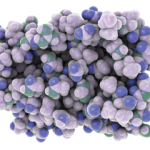Bimekizumab
Bimekizumab is a promising new IL-17A and IL-17F inhibitor for patients with psoriasis. It has not yet been FDA approved due to pandemic delays, but the outlook is good given the impressive data in a 2021 New England Journal of Medicine trial.5
For bimekizumab, the Psoriasis Area and Severity Index (PASI) 90 response exceeded 90%, compared with adalimumab, which had a PASI 90 of only 40–50%. The PASI 100 also favored bimekizumab, with 70% of participants achieving completely clear skin.
“The thing I love as a clinician about the PASI 100 is that it means you have no skin disease,” Dr. Curtis said. “So the beauty of telling a patient that there is a two-thirds to three-quarters likelihood that this drug will completely get rid of your psoriasis is very powerful.”
Regarding safety, Dr. Curtis pointed out the increased incidence of oral candidiasis in patients receiving bimekizumab, which was not appreciated with adalimumab. “About 10–15% of these patients developed thrush, which is what might be expected based on what IL-17 does. But I would just tell patients to be prepared for this. These patients didn’t get deep fungal infections.”
Data specific to psoriatic arthritis are not yet available for bimekizumab, but based on mechanism of action, we can assume it may work, and we anticipate future trials.
Molecular Signature Response Classifier
Dr. Curtis also reviewed data on the molecular signature response classifier (MSRC), a blood test that aims to predict non-responders to tumor necrosis factor inhibitors (TNFi) in patients with RA for whom methotrexate proved ineffective. The MSRC uses 19 gene expression biomarkers combined with four clinical features (i.e., anti-cyclic citrullinated peptide serostatus, sex, body mass index and patient global assessment) to generate a score on a continuous scale of 1 to 25. The higher the score, the greater the likelihood of nonresponse to TNFi therapy. The test is commercially available as PrismRA via direct online order through the manufacturer, with results available within two weeks. The manufacturer estimates the average out-of-pocket cost at approximately $75 and will assist if claims are denied. Insurance coverage for testing is evolving. Of note, lab-developed tests don’t require FDA clearance.
In a study evaluating RA biologic selection and treatment outcomes in a real-world cohort of patients with RA for whom methotrexate failed (n=212), the MSRC predicted TNFi non-response in 55% of patients and response in 45% of patients. When providers didn’t follow the recommendation of the blood test (i.e., the test recommended a non-TNFi but a TNFi was selected, likely due to insurance restrictions), the ACR50 response was only 10%. If the test recommendation was followed and a non-TNFi was selected, the ACR50 response was 35%, a statistically significant difference.6


